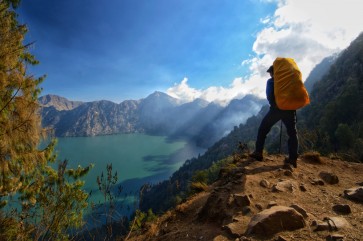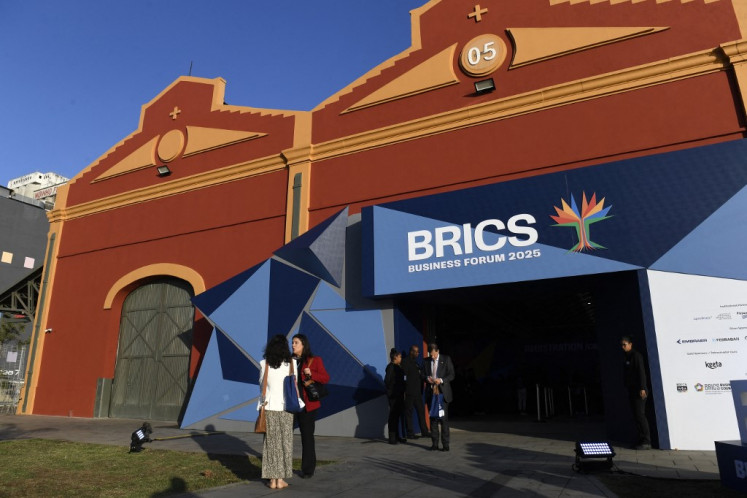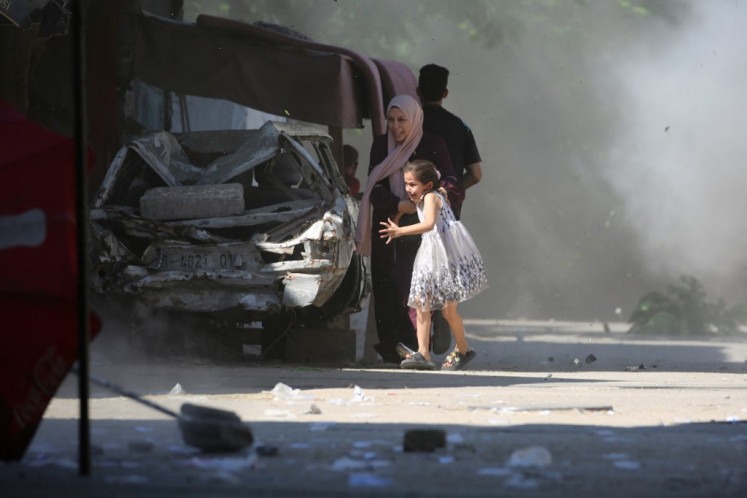Popular Reads
Top Results
Can't find what you're looking for?
View all search resultsPopular Reads
Top Results
Can't find what you're looking for?
View all search resultsOutcry intensifies over Papua blackout
Solidarity: An activist holds up a poster during a demonstration in Jakarta on Friday in protest of the internet blackout in Papua and West Papua, imposed following riots in a number of the provinces’ cities
Change text size
Gift Premium Articles
to Anyone
S
olidarity: An activist holds up a poster during a demonstration in Jakarta on Friday in protest of the internet blackout in Papua and West Papua, imposed following riots in a number of the provinces’ cities. The violence was a reaction to physical and racial abuse of Papuan students in Surabaya, East Java.(JP/Seto Wardhana)
Papua is widely known for its poor telephone and internet network, and coupled with challenging geographical terrain, it is a difficult region for gathering and verifying information.
But conditions have worsened since Wednesday when the government decided to block cellular services in Papua and West Papua under the pretext of security and maintaining stability amid unrest following racial abuse against Papuan students in Surabaya, East Java.
Dozens of human rights activists protested the blackout in front of the Communications and Information Ministry building on Friday, demanding that the government lift the restriction.
The situation has frustrated residents who want to stay informed about further violence erupting in their area. For example, witnesses in Sorong, Timika, reported hearing gunshots and tear gas being fired in their neighborhood.
A witness contacted by The Jakarta Post in Fakfak reported arson and tear gas being shot on Wednesday. The blackout was announced only hours after the government said it would deploy an additional 1,300 security personnel to the restive region.
The National Police have also confirmed that one man was killed in a shootout in Wamena, Papua. National Police spokesman Sr. Comr. Asep Adi Saputra said on Friday that the gun battle broke out as Jayawijaya Police officers and military personnel were searching for a group they believed to have fired shots near Jimawa traditional market on Thursday. The police said the man was a member of a Papuan armed group.
Ferdinandus Setu, acting head of the ministry’s public relations bureau, said the government was quite happy with the results of the internet cutoff.
“It was an effective approach. We can see that today, the situation is getting [calmer] in Papua. Since Wednesday, the traffic [of fake and provocative news] on Papua has been decreasing drastically because we blocked every cellular operator in the province. We saw a few [stories] go out because some people are using Wi-Fi to communicate. But at least we can block [...] mobile phones that use cellular internet data,” Ferdinandus told the Post on Friday.
He added that the government had not blocked all cellular communication but only cellular data or the internet.
Activists, however, fear that the block would not only prevent hoaxes from spreading but also the truth.
Institute for Policy Research and Advocacy (ELSAM) researcher Wahyudi Djafar raised concerns over the fact that the internet blackout was implemented just as over 1,000 security personnel from the Indonesian Military and National Police were deployed to Papua and West Papua.
“Internet connection is an important instrument to ensure that there are no human rights violations. When internet access is blocked, it is worrying because there is no accountability and no open information from various sources that can be accessed by the public. We have one source only and that’s the government,” he said.
Separately, Alliance of Independent Journalists (AJI) Jakarta chairman Abdul Manan pointed out that with the internet blackout, many things that happened in Papua would be missed from the public’s eye, and that means human rights violations were prone to happen with no accountability.
“It prevents the public from having factual information from Papua. It also limits journalists working to report information from Papua,” Abdul said.
Further concerns have been raised that the blackout may affect residents who find themselves in emergency situations.
Karina Larasati, 22, could not reach her father when she and her mother, a breast cancer patient at Cipto Mangunkusmo Kencana Hospital in Central Jakarta, needed him the most. Karina’s father was in Bintuni regency in Papua, where cellular services had been cut off by the government.
She wanted to tell her father that her mother had to undergo a mastectomy to treat her stage 3 breast cancer. The doctor’s order came at the same time as the internet blackout.
“I messaged him on WhatsApp and tried to reach him through all kinds of social media platforms, but we can’t [reach him]. I can’t call him either. This is a very reactive response from the government and I can’t believe they would be this inconsiderate. [The blackout] just worsens the situation,” she said.
“What about Papuans who are living outside the province? With limiting cellular access, how can they get information about what is happening to their hometown? So, we’re supposed to rely on the government’s version of truth, just like that?”










